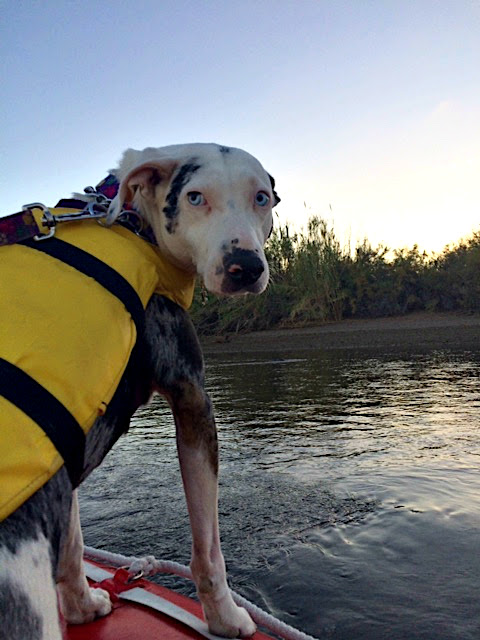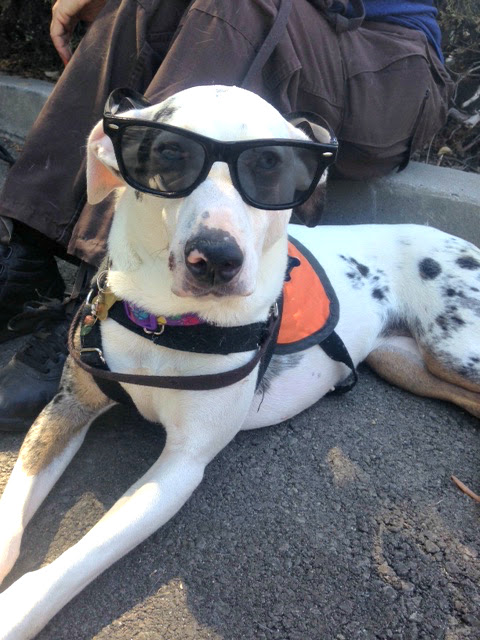
147 – Lori Wells and Piglet – Catahoula Leopard Dog|Search and Rescue
8th January 2018 • Pure Dog Talk • Laura Reeves
Shownotes
Lori Wells and Piglet – Heroes in Tragedy
Lori Wells and Piglet were winners of the AKC Humane Fund Award for Canine Excellence in the Search and Rescue category. They were honored at the AKC National Championship in Orlando, Fla. last month.Volunteer and Rare Breed Dog Provide Families Closure in Tragedies
Piglet is a 7 year old Catahoula Leopard Dog trained and certified to discover human remains, one of fewer than a half-dozen of her breed working in Search and Rescue. Wells said that the dogs feel the intensity of a search that ends with sorrow.“Absolutely. They know. They’re very intuitive,” Wells observed, while Piglet cuddled closer to her handler, responding to Wells’ emotion. “There’s such a relationship and bond you make and build with these guys through the training. You’re in tune with each other. These are our companions. Our family.”
Family Bonds in Search and Rescue
Wells and her husband met doing Search and Rescue. They work with an entirely volunteer organization that will deploy wherever their help is needed. Working to locate human remains is a very hard and emotional aspect of the Search and Rescue job, but “it’s a fabulous answer for a family that’s grieving,” Wells said.“When they told me we won (the ACE award), I was overwhelmed,” Wells said. “It’s such a huge honor to be recognized.”
Piglet the Catahoula Leopard Dog
Catahoula Leopard Dogs may not be common in Search and Rescue work, but Wells said their hunt drive makes them well suited to the task.“(Catahoulas) are the state dog of Louisiana,” Wells noted. “They were bred to herd and hunt. American Indians developed the breed in the early 1800s. Their heritage includes Beauceron, a little bit of hound dog, Spanish mastiff. And red wolf.
“Any good search dog has to have phenomenal hunt drive. Piglet comes from cow dog lines. There are cow dogs or hog dogs. Cow dogs are more settled, sensible minded.”Wells added that the breed’s stamina helps them succeed in Search and Rescue where multiple, grueling three to four hour shifts are normal.
Lori Wells and Piglet’s Success as a Team
Piglet has successfully located the deceased victims of air crashes and drownings. In one case finding a victim in California underwater after eight days of searching by rescue and law enforcement personnel.
“It takes a lot of blood sweat and tears (to train the dogs for the work),” Wells said. “A lot of hard work. A lot of time. It’s expensive with the mileage driven. But it’s a bond with your dog. There are a lot of books you can read (to learn how to train), but there’s nothing like doing it.”
Training a Search and Rescue Dog
Just like anything our dogs do for us, search and rescue dogs work for a reward. For some dogs it is toy drive, so they want to play tug or ball. “For mine,” Wells said, “I always trained them to want mommy’s love. They are so happy they’ve made me happy, so just a whole bunch of love. Because I always have that. Handlers forget treats. I’ve always got love. That’s how i do it.” Wells has trained five trailing dogs for Search and Rescue, but Piglet is the first she’s trained for locating human remains.Lori Wells and Bloodhounds
Lori also trains Bloodhounds for Search and Rescue.“When (Bloodhounds) are on scent, they’re on scent,” Wells noted wryly. “They go. You better just keep up. Just that go forward. It can get them in trouble because they don’t know their limitations. They don’t know to stop and take a break. We have to make sure they do that, give them some water and chill out. And then go back. They go right back. There’s no harm to stopping them along that trail. They don’t forget.”Wells trains her Bloodhounds on trails that are 7 to 10 days old. This is compared, for example, to tracking tests where the track is aged for a few hours. “Our training is all ages of trails, all surfaces, all weather conditions,” Wells said. “So we have a gauge to know how a dog will respond in all scenarios. We need to know how they work those scenarios and know what they’re telling us.”

Donate or Learn More at Search Dogs 24/7
FACTS ABOUT SEARCH AND RESCUE FROM SEARCH 24/7
Search Dogs 24/7 Search and Rescue Dog Teams Wilderness – Urban – Cadaver – Water – Disaster Search dogs 27/7 has a group of volunteers with specially trained dogs dedicated to assisting in the search for missing persons. Dog Teams are available 24 hours a day, 365 days a year to respond to local, state, and federal law enforcement as well as other public service agency requests. Search Dogs 24/7 Dog Teams are a volunteer resource. Members incur all costs including mileage, equipment, calling service, and dog expenses. K-9 Team members take time off work to participate in searches and training, drive thousands of miles a year, and spend 50 to 100 hours per month for training and searches. Search Dogs 24/7 K-9’s and the California Office of Emergency Service (CalOES) Search Dogs 24/7 K-9 Teams are not a direct resource to CalOES, however, each team is certified to meet or exceed CalOES Standards by one of several outside agencies. We do NOT self-certify. Relationship with local Search and Rescue units Some Search Dogs 24/7 dog teams are also volunteer members of other search and rescue groups for local, Statewide, and Federal responses. When search dogs can be helpful- An overdue hiker or hunter in a wilderness area
- An Alzheimer's patient who has wandered away
- A missing child
- A drowning victim in a lake
- An area where there may be human remains buried
- A victim buried in rubble or an avalanche
- A missing person where suicide is suspected
- Persons suspected of being in a collapsed structure
- To confirm that an article was worn by a subject
- To confirm that a subject was in a specific vehicle
- To locate human remains after a fire
- Advanced First Aid
- CPR
- Map and Compass navigation
- Survival
- Radio communications
- Helicopter operations
- Crime Scene Preservation
- Mantracking
- Fitness



